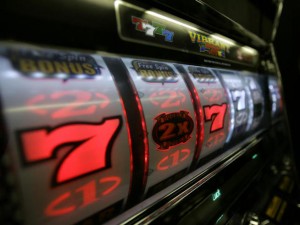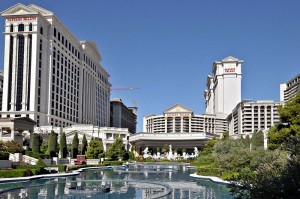 Today’s top story is the rumor, first aired on LasVegasAdvisor.com that Binion’s Gambling Hall & Hotel will close in July, lock, stock and million-dollar display. This dovetails with an earlier report that a detailed makeover is in the works. So Binion’s could follow the lead of the Plaza and go the short-term-closure route, rather than trying to overhaul on the fly. The last time owner Terry Caudill tried to redo Binion’s, cash flow petered out early in the process. One hopes that, this time, Terry has the money to see his plans through to fruition. Since rival owners like Tilman Fertitta and Derek Stevens have been upping the stakes for what’s considered an acceptable Downtown casino-hotel, Caudill can either follow suit or get left far behind. Either way, it means that Downtown is “happening” again, something for which Oscar Goodman long strove but which didn’t reach critical mass during his mayoral tenure.
Today’s top story is the rumor, first aired on LasVegasAdvisor.com that Binion’s Gambling Hall & Hotel will close in July, lock, stock and million-dollar display. This dovetails with an earlier report that a detailed makeover is in the works. So Binion’s could follow the lead of the Plaza and go the short-term-closure route, rather than trying to overhaul on the fly. The last time owner Terry Caudill tried to redo Binion’s, cash flow petered out early in the process. One hopes that, this time, Terry has the money to see his plans through to fruition. Since rival owners like Tilman Fertitta and Derek Stevens have been upping the stakes for what’s considered an acceptable Downtown casino-hotel, Caudill can either follow suit or get left far behind. Either way, it means that Downtown is “happening” again, something for which Oscar Goodman long strove but which didn’t reach critical mass during his mayoral tenure.
 I feel like Pollyanna when I read the prognostications of Ken Adams, who may be the foremost pessimist in casino industry. His grim forecast for 2013 is that “something has to give and some will have to go away if any are to is survive and make a profit … the numbers for January are painting an even darker picture.” Yes, voters and legislators continue to approve more casinos, and they’re not particularly concerned — especially in Illinois — whether adding a slot parlor here and a racino there sends Casino X over the brink in a highly taxed, limited-by-statute industry. Already, two months of slot-route revenues in Illinois have represented 5% and 7.5% of the state’s total gambling haul, while casino revenues continue to slip incrementally.
I feel like Pollyanna when I read the prognostications of Ken Adams, who may be the foremost pessimist in casino industry. His grim forecast for 2013 is that “something has to give and some will have to go away if any are to is survive and make a profit … the numbers for January are painting an even darker picture.” Yes, voters and legislators continue to approve more casinos, and they’re not particularly concerned — especially in Illinois — whether adding a slot parlor here and a racino there sends Casino X over the brink in a highly taxed, limited-by-statute industry. Already, two months of slot-route revenues in Illinois have represented 5% and 7.5% of the state’s total gambling haul, while casino revenues continue to slip incrementally.
Adams somewhat exaggerates the threat: “casinos in all three states are reported serious revenue declines which have  been attributed to Ohio casinos,” writes of Michigan, Indiana and Pennsylvania. Except for a battered Presque Isle racino in the Keystone State, I would be hard-pressed to name a casino whose revenue declines have been “serious,” unless a couple of percentage points is a matter of life or death. After all, as Adams himself says, Ohio’s much-anticipated casino rollout has been a disappointment, bordering on a flop (Horseshoe Cleveland excepted, right). And yes, Horseshoe Cincinnati could send Indiana’s Grand Victoria to the bottom. But the casino industry has never been about pulling together for mutual benefit. Not hardly! It took so long for it to reach a consensus on Internet poker that the window of opportunity slammed shut. And some, particularly Penn National Gaming, have shown no compunction whatsoever about eating their young. If the industry can capture a dollar at the source — say, Massachusetts — instead of waiting for it to reach Vegas, they’ll jump at the chance. It’s the nature of the business.
been attributed to Ohio casinos,” writes of Michigan, Indiana and Pennsylvania. Except for a battered Presque Isle racino in the Keystone State, I would be hard-pressed to name a casino whose revenue declines have been “serious,” unless a couple of percentage points is a matter of life or death. After all, as Adams himself says, Ohio’s much-anticipated casino rollout has been a disappointment, bordering on a flop (Horseshoe Cleveland excepted, right). And yes, Horseshoe Cincinnati could send Indiana’s Grand Victoria to the bottom. But the casino industry has never been about pulling together for mutual benefit. Not hardly! It took so long for it to reach a consensus on Internet poker that the window of opportunity slammed shut. And some, particularly Penn National Gaming, have shown no compunction whatsoever about eating their young. If the industry can capture a dollar at the source — say, Massachusetts — instead of waiting for it to reach Vegas, they’ll jump at the chance. It’s the nature of the business.
 In recent weeks, our Frugal Gambler, the inimitable Jean Scott has been watching the fine points of Caesars Entertainment like a hawk. OK, she likes the Bacchanal Buffet a bit more than I do but I second her endorsement of the Diamond Lounge, for those lucky enough to penetrate its seclusion. Yesterday, in a report that Caesars execs would probably prefer didn’t see the light of day, she disclosed the operations are far from the standardized across the Caesars empire (contra the claims of ex-CFO Jonathan Halkyard). Writes Jean: “Each Caesars property, although under the same corporate umbrella and with one players club, has many of its own policies and definitely individual marketing strategies. So what I say about one in Vegas may have nothing to do with one in Biloxi or Atlantic City.” That’s good strategy but it perforates the long-promulgated myth that Caesars is run with ruthless uniformity off of a spreadsheet on Gary Loveman‘s desk, as it was once put to me.
In recent weeks, our Frugal Gambler, the inimitable Jean Scott has been watching the fine points of Caesars Entertainment like a hawk. OK, she likes the Bacchanal Buffet a bit more than I do but I second her endorsement of the Diamond Lounge, for those lucky enough to penetrate its seclusion. Yesterday, in a report that Caesars execs would probably prefer didn’t see the light of day, she disclosed the operations are far from the standardized across the Caesars empire (contra the claims of ex-CFO Jonathan Halkyard). Writes Jean: “Each Caesars property, although under the same corporate umbrella and with one players club, has many of its own policies and definitely individual marketing strategies. So what I say about one in Vegas may have nothing to do with one in Biloxi or Atlantic City.” That’s good strategy but it perforates the long-promulgated myth that Caesars is run with ruthless uniformity off of a spreadsheet on Gary Loveman‘s desk, as it was once put to me.
 Meantime, blogger Ashley L. Piner points us to Forbes, as the media heavyweights begin to opine on Caesars’ new Nobu Hotel, which turns out to be anything but Imperial Palace in a toga. Reviewer Larry Olmsted spent four nights at Nobu and came away impressed. (It certainly sounds a lot better than the redone Palms Tower at the eponymous resort.) His critique is lengthy, detailed and well worth reading. He deems Nobu the antithesis of your average Vegas hotel experience … although Caesars has snuck some quasi-resort fees into your stay ($15 for WiFi, ditto for a shoeshine). It seems to be high-tech in the right ways — none of that CityCenter Larry Lightbulb stuff — and Olmsted proclaims that Nobu’s pros “especially by Las Vegas standards, far outweigh these few cons, and to recap, the major pros are: bigger and better rooms, much better check-in, check-out, and bell service, great location coupled with peaceful escapism, and one of the city’s best and hottest restaurants.”
Meantime, blogger Ashley L. Piner points us to Forbes, as the media heavyweights begin to opine on Caesars’ new Nobu Hotel, which turns out to be anything but Imperial Palace in a toga. Reviewer Larry Olmsted spent four nights at Nobu and came away impressed. (It certainly sounds a lot better than the redone Palms Tower at the eponymous resort.) His critique is lengthy, detailed and well worth reading. He deems Nobu the antithesis of your average Vegas hotel experience … although Caesars has snuck some quasi-resort fees into your stay ($15 for WiFi, ditto for a shoeshine). It seems to be high-tech in the right ways — none of that CityCenter Larry Lightbulb stuff — and Olmsted proclaims that Nobu’s pros “especially by Las Vegas standards, far outweigh these few cons, and to recap, the major pros are: bigger and better rooms, much better check-in, check-out, and bell service, great location coupled with peaceful escapism, and one of the city’s best and hottest restaurants.”
Sounds like a job well done, Imperator.
Is this … the next iteration of the Terrance Watanabe scandal? Former San Diego mayor Maureen O’Connor wagered whale-like sums of money in Vegas, Atlantic City and at California tribal casinos, supposedly in a mentally impaired state, ending $13 million in the hole. (And mostly through video poker, believe it or not.) That’s chump change compared to Watanabe’s $205 million wipeout. O’Connor has two years to repay $2.1 million she embezzled from a nonprofit, plus taxes owed to Uncle Sam … the fate of her gambling debts was not disclosed.


Wasn’t Dump Plaza the one that experimented with robotic poker and failed?
It is good news that there are even just rumors about doing something with Binion’s but if they shutter the snack bar I’ll boycott the place. The truth is that ever since it became the home of penny slots and the worst video poker downtown, I’ve just been into the place for the best hamburger in town and a shortcut to Main Street Station. They would be wise to return to the roots: good food, good whiskey and a good gamble. Binion’s hasn’t had the whole package since the 1980s.
Jean is right on the money, but, this is a surprise? Known this forever, and once upon a time, “off the menu” stuff was available in the AC and Biloxi markets.
Basically, local CET properties would ape or match whatever their competitors were doing, especially in MS.